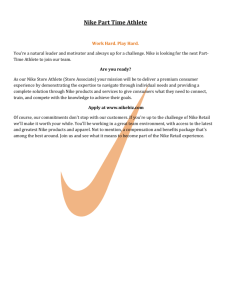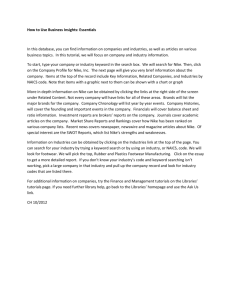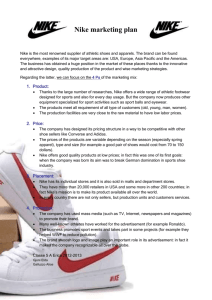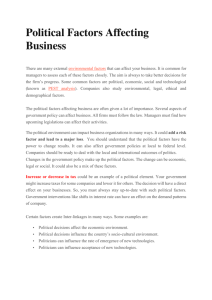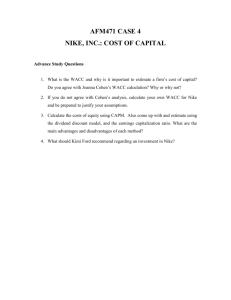Supply Chain Management - GM and Nike
advertisement
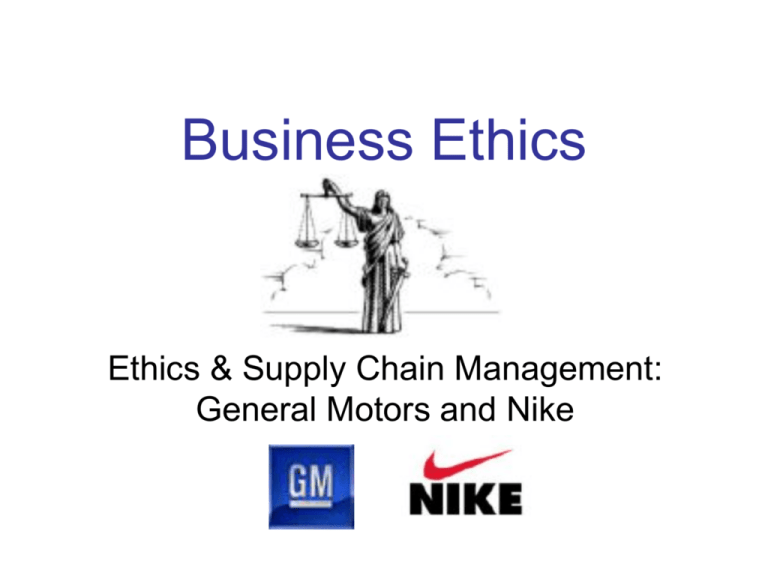
Business Ethics Ethics & Supply Chain Management: General Motors and Nike Whose Responsibility? Dominant Firm • in the supply chain should be responsible for the ethical conduct of its suppliers Why? • The most powerful value chain member bears the greatest burden of responsibility • ‘With greater power comes greater responsibilities’ • Examples in this case: Nike and GM How? • Identify & develop suppliers whose policies & values mirror their own • Able to influence supply chain due to its relative size & buying power • Willingness to end relationships/contracts with unethical suppliers or repeat offenders • Move from traditional SC sustainable SC • Includes environmental, social & ethical issues Reference: Phillips & Caldwell, Value Chain Responsibility: A Farewell to Arm’s Length Sustainable Supply Chain Management Social Issues Environmental Issues • Natural resource use • Emissions, waste • Energy loss • Use of biodiversity & deforestation • Nuclear radiation • ozone depletion • climate change • • • Role & responsibility with local community Direct & indirect employment in developing countries Investment in education & training Ethical issues • • • • • Source: www.shef.ac.uk/uni/companies Labour practices (child labour, discrimination, wages, unions, working hours, health & safety) Irresponsible marketing (marketing to children, misrepresentation) Supporting oppressive regimes Honesty, trust, respect & fairness in corporate relations Bribery & corruption GM’s Gift Policy Positives: • • • • • Minimizes opportunities and sets expectations Facilitates unbiased business decisions Provides guidelines and examples Outlines process to handle exceptions Applies universally across the company Negatives: • • • • Grey areas: Applicability not always clear Makes exceptions in certain cases depending on business interests Adopts a relativist stance – leads to inconsistency Difficult to distinguish expected social courtesy from bribes GM’s Gift Policy Does this policy do enough to Ensure ethical conduct? • It is an important means of promoting ethical conduct, but… • A policy by itself cannot ensure ethical conduct. • Other aspects are essential: Training, education, culture, environment, leadership • Ultimately, each employee is entrusted with the responsibility for ethical conduct Nike Goes Green • Starting in 1993, Nike has made big efforts to “green” its supply chain. • It began using best practices and demanded the same from its suppliers. It educated them on: – – – – Corporate environmental policy A master substances list Legislation concerning products and packaging Executive summaries on all programs so factories know which programs apply to them – A sustainability assessment – Labor practices programme information Questionable Labour Practices?? • Although Nike educates its suppliers, it has had to contend with allegations of at least one account of a subcontractor using sweatshop labour. • This has sparked much controversy and large boycotts of Nike’s shoes • But, Nike has made huge strides in environmental awareness… Does one Good Act Balance a Bad One? • There is no way one “right” can make up for a “wrong” this is a form of rationalization. • Nike has had to deal with issues facing many MNCs and it needs to lead by example. • Inappropriate labour practices can never be balanced by a sound environmental policy.

